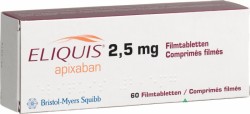Top Class Actions’s website and social media posts use affiliate links. If you make a purchase using such links, we may receive a commission, but it will not result in any additional charges to you. Please review our Affiliate Link Disclosure for more information.
Eliquis is the newest anticoagulant medication to be introduced to the American market, and is meant to be prescribed to prevent stroke in high risk patients. Experts are now unsure of the drug’s future, due to recent developments of a possible reversal agent being developed.
In a statement issued by Portola Pharmaceuticals on Oct. 1, 2014, the potential antidote for Eliquis to prevent bleeding injuries has been met with mixed results, based on the statistics from a phase III clinical trial.
The potential reversal agent, andexanet alfa, needs to be confirmed as to whether or not it can stop the blood-thinning process during an internal bleeding event. This study is being backed by several major pharmaceutical companies, because this breakthrough could mean that Eliquis could get its reversal agent before Xarelto and Pradaxa.
While advertised to be more effective and faster-acting than their predecessor Warfarin, the three new generation anticoagulants Pradaxa, Xarelto, and Eliquis each come with the extreme risk of uncontrollable internal bleeding. When Pradaxa and Xarelto were introduced, they were initially market successes but raised serious concern due to the amount of bleeding incidents reported after using the drug.
Patients alleged that the drugs’ warning labels did not warn them of the possible complications and that they had suffered avoidable injuries.
Eliquis was introduced to the market in 2012 and has yet to face the same legal woes as its predecessors, and if all goes according to the drug’s manufacturer’s plan, Eliquis will not. Previously, the manufacturing companies of the other new anticoagulants had started their own reversal agent experiments, so they could possibly find a way to counteract Xarelto and Pradaxa bleeding events.
Collaboration efforts for bleeding remedies were first announced in February 2013 when Bayer, Johnson & Johnson, and Portola Pharmaceuticals stated that they were working to find a reversal agent for Xarelto, observing the recombinant protein PRT4445.
In 2014, the U.S. Food and Drug Administration (FDA) approved the potential Pradaxa bleeding antidote, idarucizumab, which means that it may soon be available on the market. This potential reversal agent has been tested in more than 200 trials in 30 countries, as part of the clinical trial series called RE-VERSE AD. These experiments evaluated the potential reversal agent in active Pradaxa patients who suffered uncontrollable bleeding injuries.
Despite the progress seen on Pradaxa’s front, Eliquis may get its reversal agent approved for the market first with Bristol-Myers Squibb and Pfizer, the manufacturing companies of Eliquis, filing a Biologics License Application with the FDA. If granted, this would allow accelerated approval at the end of 2015.
Overview of Eliquis Complications
Eliquis is the third anticoagulant introduced to the market to compete with Warfarin. It was released soon after Pradaxa and Xarelto, and is predicted to be a marketing success due to past success of Pradaxa and Xarelto. Similar to other blood thinners, Eliquis is often prescribed to patients with atrial fibrillation to prevent heart attack or stroke.
For years, Warfarin had been the traditional blood-thinner prescribed to patients with slow but steady results. Unlike its younger competition, Warfarin required frequent dose adjustments and a reversal agent, which still makes it the safest anticoagulant on the market. Medical experts argue that a significant number of injured patients could have avoided their bleeding events if their medication dosage had been monitored.
Even with the development of bleeding reversal agents, Eliquis may still potentially face the same public scrutiny as Xarelto and Pradaxa. It still lacks an established reversal agent and does not require dose monitoring, which leaves the possibility of internal bleeding injuries.
Do YOU have a legal claim? Fill out the form on this page now for a free, immediate, and confidential case evaluation. The Eliquis attorneys who work with Top Class Actions will contact you if you qualify to let you know if an individual lawsuit or Eliquis class action lawsuit is best for you. [In general, Eliquis lawsuits are filed individually by each plaintiff and are not class actions.] Hurry — statutes of limitations may apply.
Get Help – It’s Free
Join a Free Eliquis Class Action Lawsuit Investigation
If you or a loved one took Eliquis (apixaban) and suffered injuries such as uncontrollable internal bleeding, gastrointestinal bleeding, hemorrhaging, kidney bleeding or death, you may have a legal claim. See if you qualify by filling out the short form below.
An attorney will contact you if you qualify to discuss the details of your potential case at no charge to you.
Oops! We could not locate your form.
ATTORNEY ADVERTISING
Top Class Actions is a Proud Member of the American Bar Association
LEGAL INFORMATION IS NOT LEGAL ADVICE
Top Class Actions Legal Statement
©2008 – 2024 Top Class Actions® LLC
Various Trademarks held by their respective owners
This website is not intended for viewing or usage by European Union citizens.













